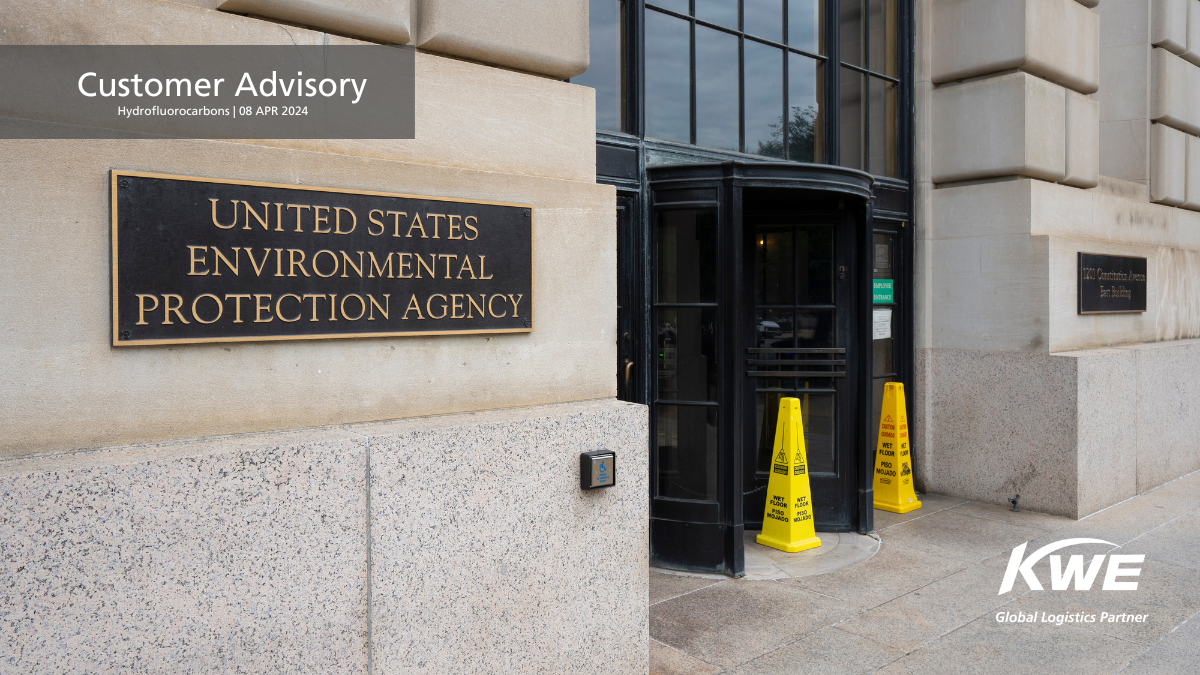Quote
U.S. EPA Introduces Stricter Regulations on Hydrofluorocarbons to Combat Greenhouse Gas Emissions

The American Innovation & Manufacturing (AIM) Act provides the Environmental Protection Agency (EPA) with the authority to oversee the production and consumption of hydrofluorocarbons, which are highly potent greenhouse gases, which accelerate climate change, which threatens society with costly health and environmental impacts such as floods, wildfires, drought, and increasingly severe weather events. As of 2018, about 75% of total HFC use in the United States occurred in refrigeration and air conditioning equipment in homes, commercial buildings, and industrial operations; approximately 8% in air conditioning in vehicles and refrigerated transport.
In accordance with 40 CFR 84.31(c)(7), EPA requires that the information be electronically filed (through ACE) by the importer of record (or the authorized agent filing on its behalf) prior to the date of importation. The EPA HFC code was deployed to CBP’s Certification environment on Dec.5, 2023.
On Jan.11, 2024, U.S. Customs announced that the Environmental PA Hydrofluorocarbons (HFC) code was being deployed. (This was originally scheduled for Jan.13, 2024.) The EPA HFC flags (EH1, EH2) will be enforced with a reject severity following the deployment.
To better understand what are HFCs, refer to CBP Publication Number 1622-1221. This publication also addresses handling of remnants (referred to as “heels”) in bulk containers, cylinders, drums, tanks, cans, etc., and provides a list of the affected HTS Codes.
The AIM Act directs the U.S. Environmental Protection Agency (EPA) not only to address HFCs, but specifically, it directs EPA to phase down production and consumption of HFCs to 15% of their baseline levels in a stepwise manner by 2036 through an allowance allocation and trading program.
Allowances are not needed when importing HFCs contained in a manufactured product such as an appliance, an aerosol can, or a foam. Allowances are only required to import bulk HFCs, regardless of the size of the container. However, the import of certain products containing and using HFCs will be prohibited starting January 1, 2025, under the Technology Transitions Program. Learn more on HFC Technology Transitions.
The number of allowances allocated to a company reflects the proportion of its individual high three-year average relative to the sum of all companies’ high three-year average and the number of generally available allowances. Entities that received allowances previously as a “new market entrant” will also receive allowances based on their share of allowances in 2023 at a proportionally lower level to reflect the reduction in available allowances in 2024 through 2028. The methodology EPA used to allocate allowances is available in 40 CFR 84.9, 84.11, and 84.13.
If an importer does not have enough (or any) allowances, there are multiple ways to acquire additional HFCs if you need more HFCs than you have allowances for.
Option 1: Purchase HFCs directly from a domestic supplier.
Option 2: Seek to obtain allowances from an existing allowance holder through an allowance transfer. To obtain allowances through a transfer, you can reference EPA’s list of allowance holders, available at HFC Allowances to see if any of the entities listed are willing to transfer allowances to you. To determine how many allowances are needed to produce or import a specific quantity of HFCs, you can use EPA’s allowance calculator.
- HFC Allowance Allocation Program – Sec.2: https://www.epa.gov/climate-hfcs-reduction/frequent-questions-phasedown-hydrofluorocarbons#HFC-allocation
- Updated HFC Tips Sheet: https://www.cbp.gov/document/fact-sheets/ace-tips-filing-epa-hfcs.
- For an FAQ on the Phasedown of Hydrofluorocarbons, please refer to: https://www.epa.gov/climate-hfcs-reduction/frequent-questions-phasedown-hydrofluorocarbons
- For information on the new rule, please visit: https://www.epa.gov/climate-hfcs-reduction/regulatory-actions-allowance-allocation-and-reporting.
- If you have questions on this version of the HFC Filing Tips Sheet please contact hfcallocation@epa.gov.
- If you still have further questions concerning the rule, please contact Pete Rodrigue at pete@epa.gov.